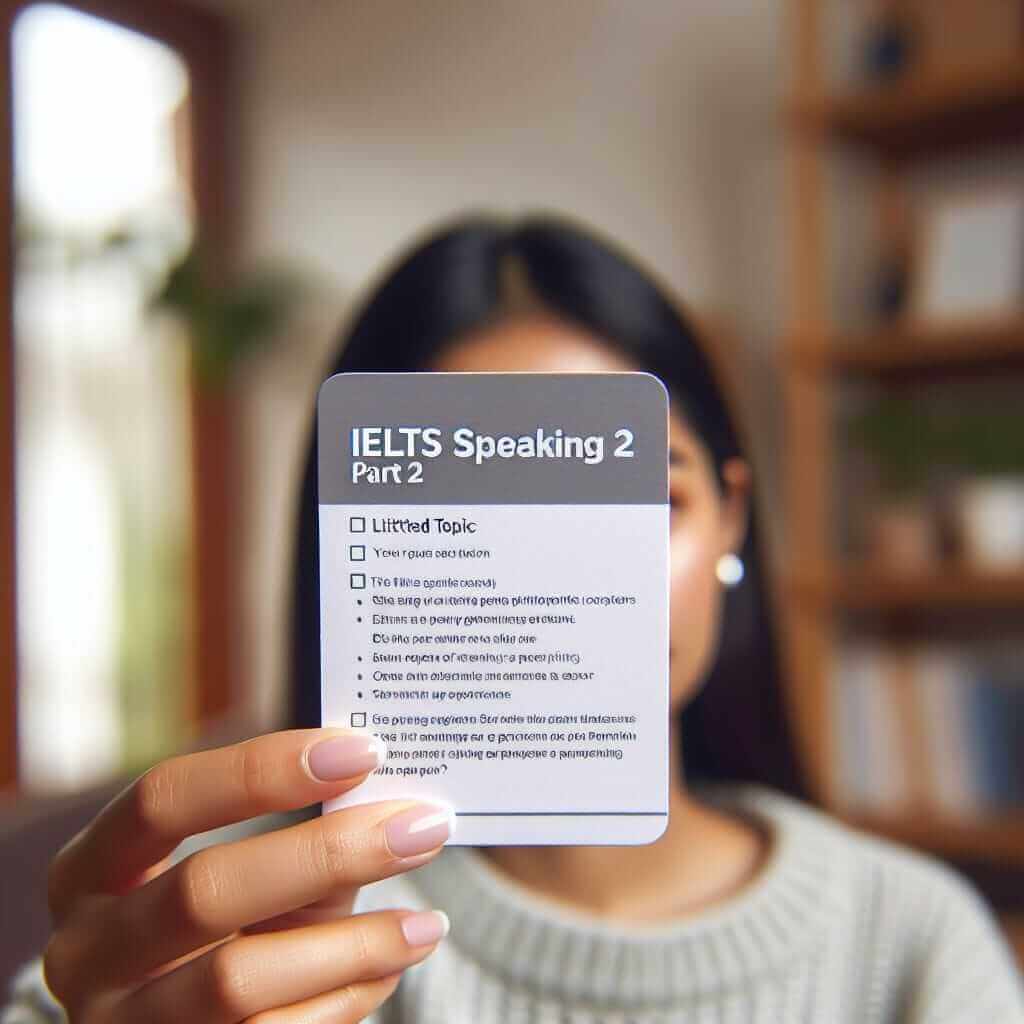The Importance of IELTS Speaking Part 2
The IELTS Speaking test can be a daunting prospect for many candidates, and Part 2, often referred to as the “Long Turn,” can feel particularly challenging. In this section, you are given a cue card with a topic and some prompts, and you have one minute to prepare a 1-2 minute speech. This tests not only your language skills but also your ability to organize your thoughts, manage your time, and deliver a coherent and engaging monologue. Mastering this part of the exam can significantly boost your overall speaking score.
Effective Strategies to Practice IELTS Speaking Part 2
Here’s how you can effectively practice for IELTS Speaking Part 2:
1. Understand the Task and Assessment Criteria
Before you begin practicing, familiarize yourself with the Speaking Part 2 rubric. Understanding how examiners assess your performance will provide you with a clear roadmap for your preparation. Key areas include:
- Fluency and Coherence: Speaking smoothly, connecting ideas logically, and using a range of cohesive devices.
- Lexical Resource: Demonstrating a wide vocabulary and using it accurately and idiomatically.
- Grammatical Range and Accuracy: Using a variety of sentence structures and grammatical forms accurately.
- Pronunciation: Speaking clearly and intelligibly, with appropriate stress, rhythm, and intonation.
2. Practice with Diverse IELTS Speaking Topics
Utilize a variety of IELTS Speaking Part 2 practice questions covering different themes such as:
- Describing a person, place, event, object, or experience
- Discussing your opinions and preferences
- Speculating about future possibilities
Practice brainstorming ideas quickly and organizing them logically within the one-minute preparation time.
3. Record and Analyze Your Practice Sessions
Recording your practice sessions is invaluable. It allows you to:
- Identify areas for improvement: Analyze your fluency, vocabulary, grammar, and pronunciation, noting areas where you excel and areas that need further development.
- Track your progress: Regularly recording yourself enables you to monitor how your speaking skills evolve over time.
4. Use Cue Cards Effectively
Don’t underestimate the value of the cue card.
- Highlight keywords: Circle or underline key terms on the card to help focus your thoughts.
- Structure your response: Use the prompts provided as a guide to structure your speech logically. Don’t feel obligated to address every single prompt, but do ensure your talk is well-organized and easy to follow.
5. Time Yourself
Practice speaking for the full 1-2 minutes. This helps you:
- Develop pacing: Learn to speak at an appropriate speed, neither rushing nor speaking too slowly.
- Manage time effectively: Ensure you cover all the main points within the allotted time.
6. Expand Your Vocabulary
A strong vocabulary is crucial for achieving a high score.
- Learn topic-specific vocabulary: Familiarize yourself with common IELTS themes and learn relevant words and phrases.
- Use synonyms and paraphrasing: Showcase your range of vocabulary by using a variety of words to express similar ideas.
7. Improve Your Grammar
Accurate grammar is essential for clear communication.
- Review grammar rules: Brush up on any grammar areas where you feel less confident.
- Practice using complex structures: Incorporate a variety of sentence structures into your speech to demonstrate your grammatical range.
8. Focus on Pronunciation
Clear pronunciation is key to ensuring your message is understood.
- Work on individual sounds: Pay attention to sounds you find difficult and practice pronouncing them correctly.
- Record and listen to yourself: Identify areas where your intonation or stress could be improved.
- Use online resources: Take advantage of pronunciation guides and exercises available online or through language learning apps.
 IELTS Speaking Part 2 Cue Card
IELTS Speaking Part 2 Cue Card
Example IELTS Speaking Part 2 Question
Describe a time you received good news.
- You should say:
- What the news was
- When and where you received it
- Who gave you the news
- And explain how you felt when you received this news.
Tips for Success
- Don’t memorize answers: Examiners can easily spot memorized responses. Instead, focus on developing your ability to speak naturally and spontaneously on a variety of topics.
- Maintain eye contact: Although you are not interacting directly with the examiner in Part 2, maintaining eye contact with the examiner while speaking can enhance your confidence and delivery.
- Use a range of discourse markers: Utilize words and phrases like “furthermore,” “in addition,” “on the other hand,” and “in conclusion” to connect your ideas and make your speech more cohesive.
- Don’t panic if you make a mistake: It’s okay to make minor errors; the examiner is primarily interested in your overall communicative ability.
Conclusion
By following these tips and practicing regularly, you can approach your IELTS Speaking Part 2 with greater confidence and significantly increase your chances of achieving your desired score. Remember, consistent effort and targeted practice are key to excelling in this challenging but rewarding section of the IELTS exam.


